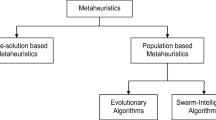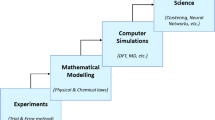Abstract
This paper presents a composite mutation operator for real-valued genetic algorithms that refines the evolutionary process using the so-called “disagreements”. The idea is theoretically described and exemplified by defining a Gaussian scheme-based disagreements operator, called 6 \({\upsigma }\) -GAD. Several tests empirically prove some advantages of this simple approach that enhances diversity and search focus.


Similar content being viewed by others
Notes
This paper is an improved and a more elaborate version of our previously published article, [20].
References
Acemoglu D, Chernozhukov V, Yildiz M (2006) Learning and disagreement in an uncertain world. NBER Working Papers 12648, National Bureau of Economic Research Inc
Acemoglu D, Como G, Fagnani F, Ozdaglar A (2010) Opinion fluctuations and disagreement in social networks. CoRR, abs/1009.2653
Acemoglu D, Ozdaglar A, Gheibi AP (2009) Spread of misinformation in social networks. CoRR, abs/0906.5007
Bäck T, Fogel D, Michalewicz Z (eds) (2000) Evolutionary Computation 1: basic algorithms and operators. Institute of Physics Publishing, Bristol
Bremermann H (1958) The evolution of intelligence: the nervous system as a model of its environment. University of Washington, Dept. of Mathematics
Chia JY, Goh CK, Tan KC, Shim VA (2011) Memetic informed evolutionary optimization via data mining. Memet Comput 3(2):73–87
Darwin C (1859) On the origin of species by means of natural selection. Murray, London
Deb K (2001) Multi-objective optimization using evolutionary algorithms. Wiley, New York
Deb K, Agrawal R (1994) Simulated binary crossover for continuous search space. Technical report, Departement of Mechanical Enginering, Indian Institute of Technology, Kanpur
Deep K, Thakur M (2007) A new mutation operator for real coded genetic algorithms. Appl Math Comput 193(1):211–230
Eiben AE, Smith JE (2003) Introduction to evolutionary computing. Springer, Berlin
Eshelman L, Schaffer J (1992) FOGA. In: Whitley L (ed) Real-coded genetic algorithms and interval-schemata. Morgan Kaufmann, pp 187–202
Fraser AS (1960) Simulation of genetic systems by automatic digital computers. III. Epistasis. Aust J Biol Sci 13:329–346
García S, Molina D, Lozano M, Herrera F (2009) A study on the use of non-parametric tests for analyzing the evolutionary algorithms’ behaviour: a case study on the cec’2005 special session on real parameter optimization. J Heuristics 15(6):617–644
Goldberg D (1989) Genetic algorithms in search, optimization and machine learning, 1st edn. Addison-Wesley Longman Publishing Co., Inc., Boston
Herrera F, Lozano M (2000) Two-loop real-coded genetic algorithms with adaptive control of mutation step sizes. Appl Intell 13(3):187–204
Holland J (1975) Adaptation in natural and artificial systems. University of Michigan Press, Ann Arbor
Kelly JD, Davis L (1991) IJCAI. In: Mylopoulos J, Reiter R (eds) A hybrid genetic algorithm for classification. Morgan Kaufmann, pp 645–650
Lihu A (2012) Disagreements—a new social concept in swarm intelligence and evolutionary computation. PhD thesis, Politehnica University of Timişoara, Romania
Lihu A, Holban C (2011) Real-valued genetic algorithms with disagreements. In: Pelta D, Krasnogor N, Dumitrescu D, Chira C, Lung R (eds) NICSO, Studies in Computational Intelligence, vol 387. Springer, Berlin, pp 333–346
Lihu A, Holban S (2011) Particle swarm optimization with disagreements. In: Tan Y, Tan Y, Shi Y, Chai Y, Wang G (eds) ICSI(1), Lecture Notes in Computer Science, vol 6728. Springer, Berlin, pp 46–55
Lihu A, Holban S (2011) Particle swarm optimization with disagreements on stagnation. In: Katarzyniak R, Chiu T, Hong C, Nguyen N (eds) Semantic methods for knowledge management and communication, Studies in Computational Intelligence, vol 381. Springer, New York, pp 103–113
McDonnell J, Reynolds R, Fogel D (1995) Evolutionary programming 4. Complex adaptive systems. Mit Press, Cambridge
Moscato P (1989) On evolution, search, optimization, genetic algorithms and martial arts: Towards memetic algorithms. Technical Report C3P Report 826, California Institute of Technology
Mühlenbein H, Schlierkamp-Voosen D (1993) Predictive models for the breeder genetic algorithm. I. continuous parameter optimization. Evol. Comput. 1:25–49
Panneton F, L’Ecuyer P, Matsumoto M (2006) Improved long-period generators based on linear recurrences modulo 2. ACM Trans. Math. Softw. 32(1):1–16
Suganthan PN, Hansen N, Liang JJ, Deb K, Chen YP, Auger A, Tiwari S (2005) Problem definitions and evaluation criteria for the CEC 2005 special session on real parameter optimization. Nanyang Technological University Technical report
Van Den Bergh F (2002) An analysis of particle swarm optimizers. PhD thesis, University of Pretoria, Pretoria, South Africa
Voigt H-M, Anheyer T (1994) Modal mutations in evolutionary algorithms. In: Proceedings of the first IEEE conference on evolutionary computation, 1994, vol 1. IEEE World Congress on Computational Intelligence, pp 88–92
Xing L-N, Chen Y-W, Yang K-W (2009) A novel mutation operator based on the immunity operation. Eur J Oper Res 197(2):830–833
Acknowledgments
This work was partially supported by the strategic grant POSDRU 6/1.5/S/13, Project ID6998 (2008), co-financed by the European Social Fund Investing in People, within the Sectorial Operational Programme Human Resources Development 2007-2013.
Author information
Authors and Affiliations
Corresponding authors
Rights and permissions
About this article
Cite this article
Lihu, A., Holban, Ş. & Popescu, OA. Real-valued genetic algorithms with disagreements. Memetic Comp. 4, 317–325 (2012). https://doi.org/10.1007/s12293-012-0098-7
Received:
Accepted:
Published:
Issue Date:
DOI: https://doi.org/10.1007/s12293-012-0098-7




